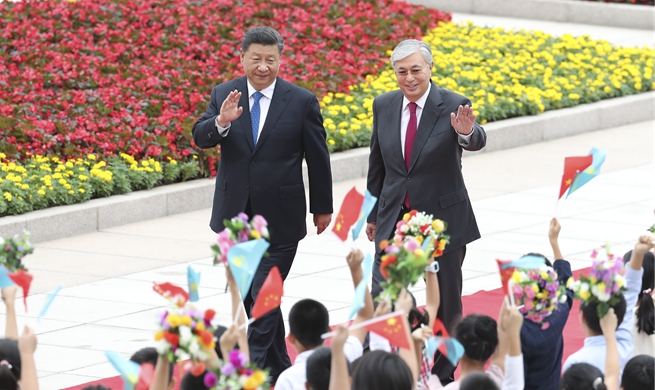BEIJING, Sept. 12 (Xinhua) -- China's pro-growth policies have started to take effect as shown by major financial data including money supply and total social financing (TSF) beating expectations.
The broad measure of money supply, or M2, increased 8.2 percent by the end of last month, accelerating from 8.1 percent in July, data from the People's Bank of China showed Wednesday.
Newly increased TSF, a measure of funds that individuals and non-financial firms get from the financial system such as trust loans and some local government bonds, rose to 1.98 trillion yuan in August from 1.01 trillion yuan a month earlier.
The stronger-than-expected TSF was partly due to resilient RMB loans, according to a report by UBS analysts Zhang Ning and Wang Tao.
In August, the new loans denominated by renminbi reached 1.21 trillion yuan (about 170 billion U.S. dollars), compared with 1.06 trillion yuan in July.
The TSF improvement was largely driven by a pick-up in medium-to-long term corporate loan issuance and smaller month-on-month outstanding non-standardized assets contraction, potentially reflecting some growth stabilization efforts to boost infrastructure-related lending, said the China International Capital Corporation Limited, an investment banking firm, in an analytical report.
China has been strengthening measures since August to channel more funds into the real economy, especially to increase lending to small and private companies.
The latest measure was to reduce the cash amount reserved in all banks, or the reserve requirement ratio (RRR), to promote support for small and private enterprises.
Meanwhile, local government bonds issuance was accelerated to improve financing efficiency.
Data from the Ministry of Finance showed that, between January and August, a total of 2.0057 trillion yuan (about 280.4 billion U.S. dollars) of special bonds were issued in China, accounting for 93.3 percent of this year's planned quota.
"With rising downward growth pressure, we continue to expect another 50 basis points RRR cuts in the rest of 2019 and 100 basis points cuts in 2020 following the latest RRR cuts," the UBS report said.
Together with continued support for small-and-medium enterprises and the private sector, it expected China's adjusted TSF credit growth to pick up modestly to above 11 percent at the end of 2019.

















